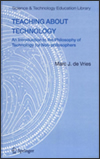Element 1 - Aspect 1: Understanding Technology
Describes why technology is a fundamental part of "what it is to be human". It allows humans to address issues of survival, well being, and improve their quality of life through the use of intellectual and practical resources (Homo faber – humans who make things).
Aspect Purpose: To support student teachers to develop a broad view of technology as socially embedded, recognising that it is neither new nor exclusively "high tech".
Key words: Technology, socially embedded, "high tech"
Resources that have been reviewed
Book review

de Vries, M. J. (2005). Teaching about technology: An introduction to the philosophy of technology for non-philosophers. Dordrecht, The Netherlands:
Available from: Springer. pp. 170, ISBN 1-4020-3409-1
Teaching about Technology: An Introduction to the Philosophy of Technology for Non-Philosophers provides a link between philosophies of technology and technology education. The book offers a thorough introduction to the nature of philosophy that aids the reader in understanding fundamental concepts (such as ontology and epistemology) as they relate to the individual and knowledge.
This book also includes examples of how various philosophers have viewed knowledge in the past and a progression of the beliefs of technology philosophers' up to the present. De Vries uses philosophy as a "sieve" to sort technologies. He does this by characterising technology artefacts and discussing how these characterisations may differ due to philosophical points of views.
Following a similar pattern, de Vries goes on to describe technological knowledge, technological processes, technological ethics, and aesthetics. He describes what they are and what people believe about them.
In addition, de Vries outlines several perspectives on technology curricula and their origins and includes portions of the Standards for Technological Literacy: Content for the Study of Technology and other prominent curriculum perspectives.
Finally, de Vries outlines several methods of instruction useful in helping students to understand technology.
Reviewed by: Cliff Harwood
Teaching about Technology: An Introduction to the Philosophy of Technology for Non-philosophers, chapter review
Chapter One: Philosophy of Technology: What and Why? pages 1-12
Chapter one discusses what is meant by the philosophy of technology and why educators would want to know about it. It begins with an analysis of philosophy in general, identifying several fields of study before looking at technology specifically. In the final section de Vries argues why educators should care about philosophy citing Socrates as an example.
Reviewed by: Gary O'Sullivan
Keywords: philosophy, ontology, epistemology, nature of technology, artefact, technological knowledge, technological processes, technological ethics, and aesthetics
Book review

Basalla, G. (1988). The evolution of technology. Cambridge: Cambridge University Press. ISBN 0 521 29681
The Evolution of Technology presents an evolutionary theory of technological change based on recent scholarship in the history of technology and on relevant material drawn from economic history and anthropology.
The book challenges the popular notion that technological advances arise from the efforts of a few heroic individuals who produce a series of revolutionary inventions that owe little or nothing to the technological past.
Analogies drawn selectively from the theory of organic evolution, rather than from the theory and practice of political revolution, shape the book’s argument.
Three themes appear, with variations, throughout the study.
- Diversity – an acknowledgment of the vast numbers of different kinds of made things (artefacts) that long have been available to humanity.
- Necessity – the mistaken belief that humans are driven to invent new artefacts in order to meet basic biological needs such as food, shelter, and defence.
- Technological evolution – an organic analogy that explains both the emergence of novel artefacts and their subsequent selection by society for incorporation into their material life without invoking either biological necessity or technological process.
Keywords: artefact, diversity, necessity, technological education
Book review

Bronowski, J. (1973). The Ascent of Man. London: BBC. Video series and book. ISBN 1849901155
An account of man's development through his scientific and technological achievements. The book and video series provide elegantly expressed insights into the fundamental place of technology (and science) in the development of humankind.
Keywords: scientific, technological, achievement
Book chapter
Burns, J. (1997). "Technology – the Intervening World" in Burns, J.(Ed.), Technology in the New Zealand Curriculum Perspectives in Practice, 15-30, Palmerston North. The Dunmore Press.
Review: Chapter ISBN 0-86469-280-3
In this chapter, Burns provides an introduction to "what is technology?" She uses a historical perspective to challenge existing ideas of technology as being "high tech", "digital" or "food technology", and to develop readers' understandings that technology is value based and culturally situated.
The chapter introduces a number of illustrations to show that technology encompasses not only products but also systems, and the use and development of processes. The chapter briefly discusses two models of Technological Practice: The Reflective and Active Capability model (Kimbell 1993) and Diagrammatic Definition of "Technology" and "Technology Practice" Pacey (1983).
Keywords: technology, technology practice, value laden
Reviewed by: Wendy Fox-Turnbull
Book chapter
Durie, Arohia. (1997). "Technology and Māori", in Burns, J.(Ed.), Technology in the New Zealand Curriculum Perspectives in Practice, 31-45, Palmerston North. The Dunmore Press.
Review: Chapter 2 ISBN 0-86469-280-3
This chapter focuses on the relationship between Māori cultural philosophy and Māori technology through exploring a number of different contexts. Durie discusses the importance of technology through providing examples such as survival – taonga, food preservation, and communication strategies. The chapter also discusses the philosophies underlying Māori assumptions of the interconnectedness of all this, and the interwoven nature of actions and consequences.
Keywords:
Māori technology, taonga, food preservation, communication strategies
Reviewed by: Wendy Fox-Turnbull
Book review
Title:Technology and Values: Essential Readings
Reference: Hanks, C. (2010). Technology and Values: Essential Readings ISBN 1405149000
Review Statement
This book addresses a need for reference material in this area. A rich, versatile resource for anyone interested in deep philosophical questions related to technology per se, it is a meaty read covering technology from a number of philosophical lenses ranging from autonomy of technology through to environmental values.
Keywords: philosophy, ontology, epistemology
Reviewer: Gary O'Sullivan
